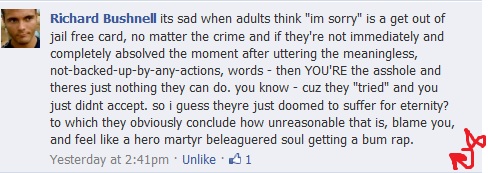So, you screwed up. The natural reaction is to apologize. It’s great to be able to own up to your wrongdoings – many cannot. But do you mean it?
My last blog entry, might cause many to ask even more questions about apologies: What *is* a proper apology? How do you know if someone means it? Why isn’t an apology enough? In short, what lies behind those timeless words… “I’m Sorry”?
http://www.youtube.com/watch?v=2FZxnGq6uNI
(Cue to unrelated Madonna song of the same name)
When I agreed with my friend Rich (in that it is insufficient for a pro-football player to apologize for participating in dog fighting/the brutal murder and torture of dogs), he expounded with the following comment:
This brought to mind for me, what Richard would soon dub my “Five Point Apology”. It is rather simple, and I feel that it applies to every situation: Whether it be pit fighting or arson versus cheating on an exam or just a soon-to-be “ex”.
You see, to me, the words “I’m sorry”, when truly meant (not just uttered as a perfunctory means to an end), signify several things, including but not limited to:
1 – “Given the opportunity to redo the past, I would retract my transgressions.”
2 – “Since I truly MEANT number one (above), and since I realize that time travel is not possible, I will instead treat henceforth as the ‘past/opportunity I get to redo’, wherein I can thus promise on all things – tangible or conceptual – which carry any value to me, that I will never repeat said mistake again.”
3- “My sorrow is genuine regret for what I *did*; NOT for the fact that I was found out.”
4 – “The words ‘I am sorry’ carry a deeper meaning to me than a mere fear based response to the possibility of the ramifications I may face in light of my wrongdoing
5 – Chances are that most repeat offenders (those who abuse the phrase “I’m sorry”) won’t get this far, because they realize they’re fullofit
At the end of the day, just remember: Sincerity is the salt, seasoning, and sauce of a “Mea Culpa” souffle.
xoxo
<3~A

